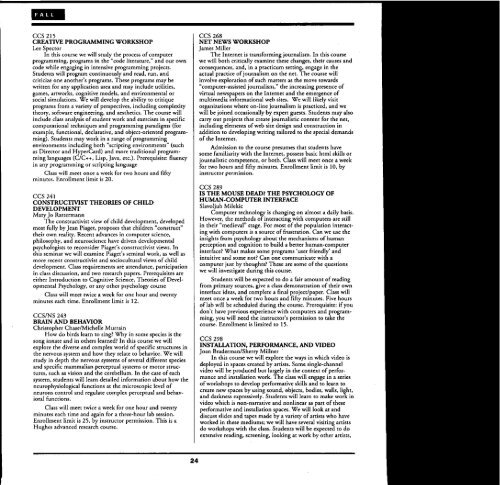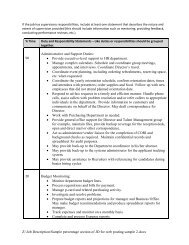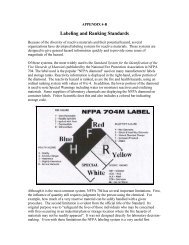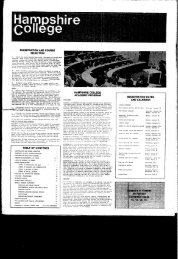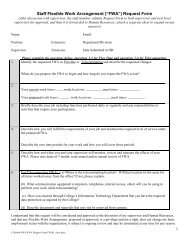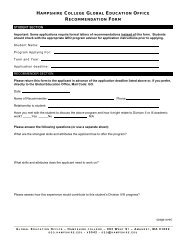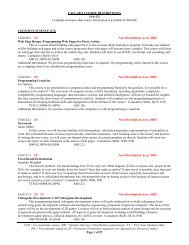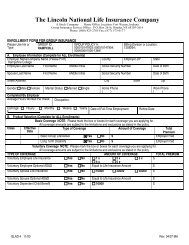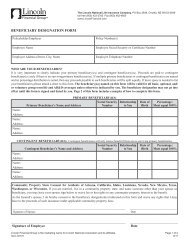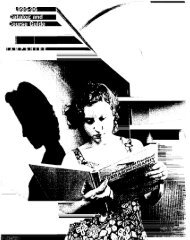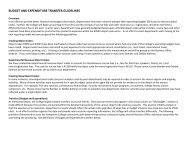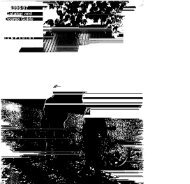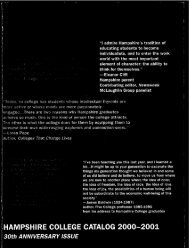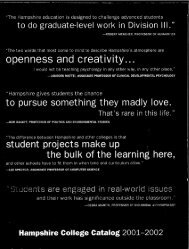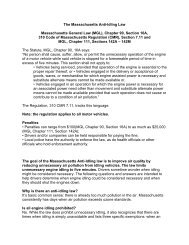school of social science - Hampshire College
school of social science - Hampshire College
school of social science - Hampshire College
You also want an ePaper? Increase the reach of your titles
YUMPU automatically turns print PDFs into web optimized ePapers that Google loves.
CCS 215<br />
CREATIVE PROGRAMMING WORKSHOP<br />
Lee Spector<br />
In this course we will study the process <strong>of</strong> computer<br />
programming, programs in the "code literature," and our own<br />
code while engaging in intensive programming projects.<br />
Students will program continuously and read. run, and<br />
criticize one another's programs. These programs may be<br />
written for any application area and may include utilities,<br />
games, artworks, cognitive models, and environmental or<br />
<strong>social</strong> simuladons. We will develop the ability to critique<br />
programs from a variety <strong>of</strong> perspectives, including complexity<br />
theory. s<strong>of</strong>tware engineering, and aesthetics. The course will<br />
include class analysis <strong>of</strong> student work and exercises in specific<br />
computational techniques and programming paradigms (for<br />
example, functional, declarative, and object-oriented programming).<br />
Students may work in a range <strong>of</strong> programming<br />
environments including both "scripting environments" (such<br />
as Director and HyperCard) and more traditional programming<br />
languages (C/C++, Lisp, Java, etc.). Prerequisite: fluency<br />
in any programming or scripting language<br />
Class will meet once a week for two hours and fifty<br />
minutes. Enrollment limit is 20.<br />
CCS 241<br />
CONSTRUCTMST THEORIES OF CHILD<br />
DEVELOPMENT<br />
Mary Jo Rattermann<br />
The constructivist view <strong>of</strong> child development, developed<br />
most fully by Jean Piaget, proposes that children "construct"<br />
their own reality. Recent advances in computer <strong>science</strong>,<br />
philosophy, and neuro<strong>science</strong> have driven developmental<br />
psychologists to reconsider Piaget's constructivist views. In<br />
this seminar we will examine Piaget's seminal work, as well as<br />
more recent construcrivist and sociocultural views <strong>of</strong> child<br />
development. Class requirements are anendance, participarion<br />
in class discussion, and two research papers. Prerequisites are<br />
either Introduction to Cognitive Science, Theories <strong>of</strong> Developmental<br />
Psychology, or any other psychology course<br />
Class will meet twice a week for one hour and twenty<br />
minutes each time. Enrollment limit is 12.<br />
CCS/NS 243<br />
BRAIN AND BEHAVIOR<br />
Christopher Chase/Michelle Murrain<br />
How do birds learn to sing? Why in some species is the<br />
song innate and in others learned? In this course we will<br />
explore the diverse and complex world <strong>of</strong> specific structures in<br />
the nervous system and how they relate to behavior. We will<br />
study in depth the nervous systems <strong>of</strong> several different species<br />
and specific mammalian perceptual systems or motor structures,<br />
such as vision and the cerebellum. In the case <strong>of</strong> each<br />
system, students will learn detailed information about how the<br />
neurophysiological functions at the microscopic level <strong>of</strong><br />
neurons control and regulate complex perceptual and behavioral<br />
functions.<br />
Class will meet twice a week for one hour and twenty<br />
minutes each rime and again for a three-hour lab session.<br />
Enrollment limit is 25. by instructor permission. This is a<br />
Hughes advanced research course.<br />
24<br />
CCS 268<br />
NET NEWS WORKSHOP<br />
J ames Miller<br />
The Internet is transforming journalism. In this course<br />
we will both critically examine these changes. their causes and<br />
consequences, and, in a practicum setting. engage in the<br />
actual practice <strong>of</strong> journalism on the net. The course will<br />
involve exploration <strong>of</strong> such matters as the move towards<br />
"computer-assisted journalism," the increasing presence <strong>of</strong><br />
virtual newspapers on the Internet and the emergence <strong>of</strong><br />
multimedia informational web sites. We will likely visit<br />
organizations where on-line journalism is practiced, and we<br />
will be joined occasionally by expert guests. Students may also<br />
carry out projects that create journalistic content for the net,<br />
including elements <strong>of</strong> web site design and construction in<br />
addition to developing writing tailored to the special demands<br />
<strong>of</strong> the Internet.<br />
Admission to the course presumes that students have<br />
some familiarity with the Internet. possess basic html skills or<br />
journalistic competence, or both. Class will meet once a week<br />
for two hours and fifty minutes. Enrollment limit is 10. by<br />
ins£ructor permission.<br />
CCS 289<br />
IS THE MOUSE DEAD! THE PSYCHOLOGY OF<br />
HUMAN-COMPUTER INTERFACE<br />
Slavoljub Milekic<br />
Computer technology is changing on almost a daily basis.<br />
However. the methods <strong>of</strong> interacting with computers are still<br />
in their "medieval" stage. For most <strong>of</strong> the population interacting<br />
with computers is a source <strong>of</strong> frustration. Can we use the<br />
insights from psychology about the mechanisms <strong>of</strong> human<br />
perception and cognition to build a better human-computer<br />
interface? What makes some programs 'user friendly' and<br />
intuitive and some not? Can one communicate with a<br />
computer just by thoughts? These are some <strong>of</strong> the questions<br />
we will investigate during this course.<br />
Students will be expected to do a fair amount <strong>of</strong> reading<br />
from primary sources, give a class demonstration <strong>of</strong> their own<br />
interface ideas. and complete a final project/paper. Class will<br />
meet once a week for two hours and fifty minutes. Five hours<br />
<strong>of</strong> lab will be scheduled during the course. Prerequisite: if you<br />
don't have previous experience with computers and programming,<br />
you will need the instructor's permission to take the<br />
course. Enrollment is limited to 15.<br />
CCS 298<br />
INSTALlATION, PERFORMANCE, AND VIDEO<br />
Joan Braderman/Sherry Millner<br />
In this course we will explore the ways in which video is<br />
deployed in spaces created by artists. Some single-channel<br />
video will be produced but largely in the context <strong>of</strong> performance<br />
and installation work. The class will engage in a series<br />
<strong>of</strong> workshops to develop performative skills and to learn to<br />
create new spaces by using sound, objects. bodies. walls. light,<br />
and darkness expressively. Students will learn to make work in<br />
video which is non-narrative and nonlinear as part <strong>of</strong> these<br />
performative and installation spaces. We will look at and<br />
discuss slides and tapes made by a variety <strong>of</strong> artists who have<br />
worked in these mediums; we will have several visiting artists<br />
do workshops with the class. Students will be expected to do<br />
extensive reading, screening, looking at work by other artists.


